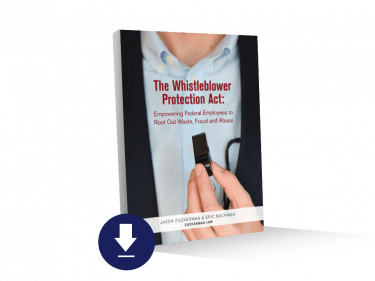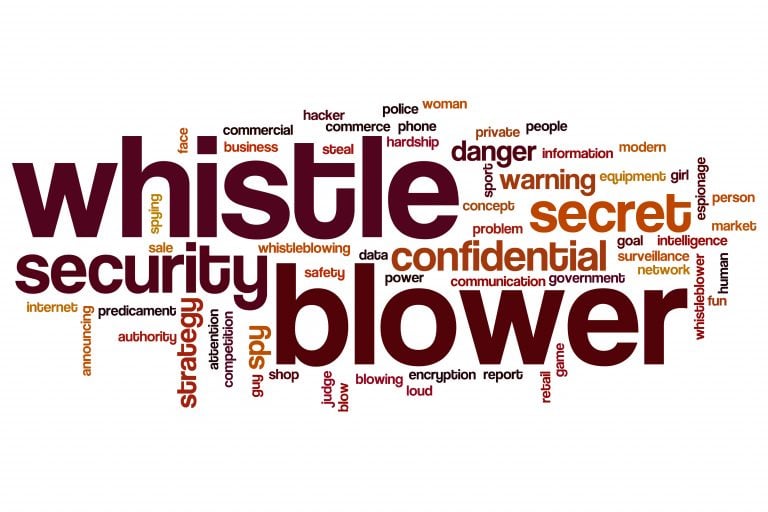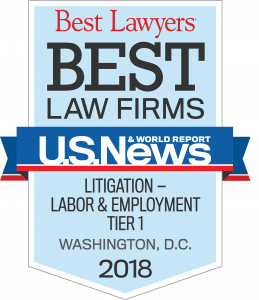Case Clarifies Whistleblower Protection Act Burden of Proof
The U.S. Court of Appeals for the Federal Circuit’s recent decision in Miller v. Dep’t of Justice, No. 2015-3149 (Fed. Cir. Dec. 2, 2016) clarifies the standard for determining whether an agency has met its burden under the Whistleblower Protection Act (WPA) to prove by clear and convincing evidence that it would have taken the same personnel action in the absence of the employee’s protected whistleblowing.
Takeaways for Government Whistleblowers
- In evaluating an employer’s evidence of independent causation under the WPA, courts consider three nonexclusive factors first articulated in Carr v. Social Security Administration, 185 F.3d 1318, 1323 (Fed. Cir. 1999): the strength of the evidence, the employer’s retaliatory motive, and how the employer has handled similarly situated non-whistleblowers.
- Testimonial evidence alone may be sufficient to support a showing of independent causation.
- In evaluating an employer’s retaliatory motive, the court must consider the motives of everyone involved in the decision to take the adverse personnel action, including those who were not directly involved in the work implicated by the protected disclosures.
- Courts should evaluate the treatment of similarly situated non-whistleblowers throughout the entire agency, not only those in the whistleblower’s immediate work unit.
Background
Troy Miller served as a superintendent of industries at the Federal Correctional Complex in Beaumont, Texas. His job involved overseeing a prison factory that produced military ballistic helmets. Mr. Miller managed the factory budget; handled contracts with external suppliers; hired, trained, and supervised inmate staff; and developed and maintained the prison factory’s production schedules. Mr. Miller and his direct supervisor, prison warden Jody Upton, worked for the Federal Bureau of Prisons within the Department of Justice (“DOJ”). The prison factory was operated by UNICOR, a government-owned corporation.
On October 7, 2009, Mr. Miller reported to UNICOR and Upton what he believed was mismanagement of funds at the factory. Just more than a month later, on December 15, 2009, the DOJ Office of Inspector General (“OIG”) visited the factory to investigate the reported misconduct. At OIG’s request, Upton told Mr. Miller not to report to work that day so that his staff would not feel uncomfortable or intimidated by the presence of their supervisor during OIG’s investigation.
On December 16, 2016, the day after OIG’s visit, Mr. Miller reported to Upton that someone had “sabotage[d]” the factory by placing a rejected material on the production line. Mr. Miller said the factory should close pending an investigation of the incident. “[T]here’s a U.S. Marine’s life at the end of this helmet, period,” Mr. Miller testified. “And it is my responsibility as a superintendent of industries when I see anything that is wrong, to report it immediately and to stop production.”
Hours later, Upton told Mr. Miller that he was being reassigned from the factory and was no longer a superintendent of industries. Undisclosed individuals at OIG directed Upton to make the reassignment because they were concerned that Mr. Miller’s presence at the factory would compromise their investigation. OIG later informed Upton that Mr. Miller himself was a subject of the investigation.
Mr. Miller spent the next four and a half years being continually reassigned by Upton, supposedly at OIG’s behest, to handle menial jobs such as wiping tables clean, watching inmates clean floors, and shredding documents. Eventually, Mr. Miller was assigned to the prison’s administrative building and was ordered to sit on a couch in the lobby of the building, without receiving any work to perform. After sitting on the couch for eight months, Mr. Miller received an office, but still no work. OIG claimed that any contact between Mr. Miller and the inmates could threaten the investigation.
Mr. Miller filed an individual right of action (“IRA”) appeal with the Merit Systems Protection Board (“MSPB” or “Board”) and claimed that the DOJ violated the WPA by taking adverse personnel actions against him motivated, in part, by his protected disclosures about fund mismanagement, in October 2009, and factory sabotage, in December 2009.
Whistleblower Protection Act Burden of Proof
IRA appeals under the WPA follow a burden-shifting framework: first, the employee-whistleblower must show by preponderant evidence that (1) he or she made a protected disclosure under 5 U.S.C. § 2302(b)(8); and (2) the protected disclosure was a “contributing factor” to an adverse personnel action taken against the employee-whistleblower. If the employee-whistleblower satisfies his or her burden, then the employer-agency must prove by clear and convincing evidence that it would have taken the same action against the employee-whistleblower absent the protected disclosure. “Clear and convincing” evidence, the court explained, is “evidence which produces in the mind of the trier of fact an abiding conviction that the truth of a factual contention is ‘highly probable.’” (quoting Price v. Symsek, 988 F.2d 1187, 1191 (Fed. Cir. 1993)). This is a higher bar than preponderant evidence but lower than beyond a reasonable doubt.
The administrative judge (“AJ”) found that Mr. Miller established a prima facie case, so the burden shifted to the Government for rebuttal. Relying almost entirely on Upton’s testimony, the AJ found that the Government met its burden.
Mr. Miller petitioned for review by the full Board, which affirmed the AJ’s decision. Mr. Miller then appealed the Board’s final decision to the U.S. Court of Appeals for the Federal Circuit.
The only issue on appeal was “whether substantial evidence supports the Board’s determination that the Government showed independent causation by clear and convincing evidence.” The substantial-evidence standard requires “such relevant evidence as a reasonable mind might accept as adequate to support a conclusion.” (quoting Consol. Edison Co. of N.Y. v. NLRB, 305 U.S. 197, 229 (1938)). Any Board determination that fails to account for contrary evidence is unreasonable and so not supported by “substantial evidence.”
The determination of whether an employer-agency has met its burden to demonstrate independent causation is guided by three nonexclusive factors, first articulated in Carr v. Social Security Administration, 185 F.3d 1318, 1323 (Fed. Cir. 1999):
- “the strength of the agency’s evidence in support of its personnel action”;
- “the existence and strength of any motive to retaliate on the part of the agency officials who were involved in the decision”; and
- “any evidence that the agency takes similar actions against employees who are not whistleblowers but who are otherwise similarly situated.”
First Carr Factor (strength of justification for personnel action)
The first Carr factor requires that the court evaluate whether the Government’s evidence of independent causation was “strong.” The Government’s evidence included:
- Upton’s testimony that he reassigned Mr. Miller because of OIG’s assertions that Mr. Miller would interfere with its investigation;
- Miller’s testimony that Upton informed him that OIG had ordered Upton to reassign him; and
- Upton’s testimony that Mr. Miller’s continual reassignment was due to OIG’s warnings that Mr. Miller was interfering with its investigation.
Regarding this evidence, the Federal Circuit stated that “Warden Upton’s conclusory testimony about OIG’s statements is not made more sufficient or clear and convincing simply by being repeated several times.” The court found that the Government failed to produce any evidence of how Mr. Miller could compromise or be a target of the investigation, particularly considering that the investigation was into the very activity that Mr. Miller reported. The Government produced no documentary evidence; there was not even a paper trail from Mr. Miller’s numerous reassignments.
The overall record, moreover, painted Mr. Miller as anything but a problematic employee. Mr. Miller received “outstanding” performance reviews, which were corroborated by Upton’s testimony that he was “a fantastic employee” who was “confident, organized, [and] very on top of things,” and with whom Upton had “absolutely no concerns.”
In light of the “lack of corroboration, the dearth of documents, emails, or records, and even the lack of detail in Warden Upton’s recollection,” the Federal Circuit concluded that “a factfinder could [not] reasonably conclude that the Government presented strong evidence of independent causation.” Therefore, contrary to the MSPB’s conclusion, the Federal Circuit found that the first Carr factor weighed against the Government. The court stressed that testimony need not be corroborated in order to support a showing of independent causation; it found only that Upton’s testimony in this case was insufficient to constitute “strong” evidence thereof.
Second Carr Factor (motive to retaliate)
The second Carr factor requires the court to determine whether the decisionmakers were motivated to retaliate against the whistleblower. Relying on “the fact that Warden Upton did not exercise direct oversight over the factory and the Warden’s testimony that it did not matter much to him whether the factory turned a profit,” the AJ found that Upton had “little or no” retaliatory motive vis-à-vis Mr. Miller.
The Federal Circuit warned that finding no retaliatory motive simply because a supervisor was not directly involved in the work implicated by an employee’s protected disclosure is unduly restrictive and dismissive: “[t]hose responsible for the agency’s performance overall may well be motivated to retaliate even if they are not directly implicated by the disclosures, and even if they do not know the whistleblower personally, as the criticism reflects on them in their capacities as managers and employees.” (quoting Whitmore v. Dep’t of Labor, 680 F.3d 1353, 1370 (Fed. Cir. 2012)).
Furthermore, the Federal Circuit found that the AJ improperly neglected to consider OIG’s retaliatory motive in addition to Upton’s. The second Carr factor is “directed towards ‘agency officials who were involved in the decision,’ not just the employee’s direct supervisor.” (quoting Carr, 185 F.3d at 1323). Because OIG supposedly directed Upton to reassign Mr. Miller, the Federal Circuit found it was imperative to evaluate whether OIG had a motive to retaliate against Mr. Miller.
Even though the MSPB failed to consider OIG’s potential retaliatory motive, the Federal Circuit found that, in light of Upton’s testimony, the MSPB’s conclusion that this factor weighs in the Government’s favor was reasonable.
Third Carr Factor (treatment of similarly situated non-whistleblowers)
The third Carr factor looks to the employer’s treatment of similarly situated non-whistleblowers. The AJ concluded that there was no basis for this analysis because Upton testified that “no other similar investigations involving members of his executive staff occurred during his tenure as Warden.”
The Federal Circuit found the AJ’s analysis to be too narrow. Upton’s testimony indicated merely that there were no similarly situated non-whistleblowers “only at the Beaumont prison facility working on the Warden’s four-member executive staff specifically and only during his tenure there.” The court continued: “The Government introduced no evidence as to what actions it takes against other DOJ employees during OIG investigations despite this factor being directed to the ‘agency’ rather than to a particular supervisor at a particular Federal Bureau of Prisons facility.”
The Government, as the party that has access to information about its own investigations, bears the risk of having no evidence in the record for this factor. In fact, “the absence of any evidence concerning Carr factor three may well cause the agency to fail to prove its case overall.” (quoting Whitmore, 680 F.3d at 1374).
Ultimately, the Federal Circuit concluded that this factor was not very consequential to this analysis but, if anything, weighed against the Government.
Impact of Miller on Whistleblower Protection Act Cases
The Government produced some evidence for the second Carr factor. However, the strength of its evidence (first Carr factor) was weak, and it failed to provide any evidence for the third Carr factor. The Federal Circuit found a dearth of independent-causation evidence—the Government produced “no testimony other than Warden Upton’s conclusory testimony, no documents whatsoever supporting the agency’s action, and no records to document similar actions in other cases.” Therefore, the Federal Circuit concluded that there was not “substantial evidence” supporting the MSPB’s conclusion that the Government proved by “clear and convincing” evidence that it would have reassigned Mr. Miller had he not made the protected disclosures.
The Federal Circuit reversed the MSPB’s decision and remanded for, in part, determination of the appropriate remedy owed to Mr. Miller for the improper personnel actions taken against him.
Whistleblower Lawyers’ Guide for Federal Employee Whistleblowers
Whistleblower attorneys Eric Bachman and Jason Zuckerman, former senior officials at the U.S. Office of Special Counsel, have released a guide for federal employee whistleblowers titled The Whistleblower Protection Act: Empowering Federal Employees to Root Out Waste, Fraud and Abuse and is available for download by clicking here. The goal of the guide is to inform federal employees about the whistleblower rights and protections available under the Whistleblower Protection Act, as amended by the Whistleblower Protection Enhancement Act and the Follow the Rules Act.
The goal of the guide is to inform federal employees about the whistleblower rights and protections available under the Whistleblower Protection Act, as amended by the Whistleblower Protection Enhancement Act and the Follow the Rules Act.
Experienced Washington DC Whistleblower Protection Act Lawyers
Zuckerman Law has represented whistleblowers before the Office of Special Counsel, Offices of Inspectors General, and Congressional oversight committees. The firm is uniquely qualified to represent whistleblowers in the federal government because two of the firm’s attorneys served in senior roles at the U.S. Office of Special Counsel.
If you are seeking representation in a whistleblower protection case, click here, or call us at 202-262-8959 to schedule a free preliminary consultation.
- Eric Bachman served as Deputy Special Counsel, Litigation and Legal Affairs, OSC, where he spearheaded an initiative to combat whistleblower retaliation at the Department of Veterans Affairs. During Bachman’s tenure at OSC, the number of favorable actions for whistleblowers increased by over 50% agency-wide.
- Jason Zuckerman served as Senior Legal Advisor to the Special Counsel at OSC, where he worked on implementation of the Whistleblower Protection Enhancement Act and several high-profile investigations.
The firm has represented whistleblowers testifying before the House Financial Services Committee and vigorously opposed efforts to silence whistleblowers. The whistleblower protection lawyers at Zuckerman Law have also helped federal employees combat unlawful gag provisions in agency policies or agreements.









